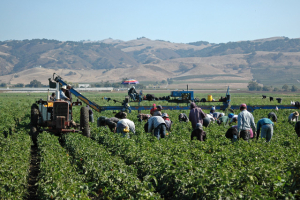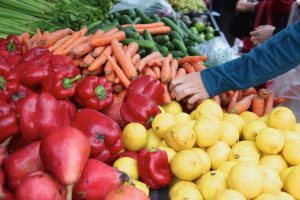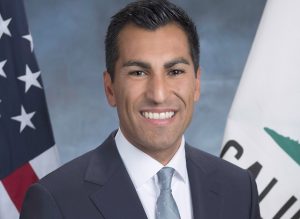California and the Future of Food, Wine and Community
November 17, 2008 Michael R. DimockI recently had the opportunity to give the keynote presentation to the 4th Annual Sustainable Ag Expo in Monterey California, November 12, 2008, entitled "California and the Future of Food, Wine and Community." The Expo is produced by the Central Coast Vineyard Technical Team. 2500 growers of wine grapes and other crops mainly from the central coast gather to study sustainable farming practices and related issues.
Please continue reading for the full text of the remarks.
"Thank you for inviting me to share some thoughts with you about a subject of common interest: wine, food, agriculture and future of California.
I am delighted to be a part of this wonderful and important meeting of the most innovative farmers, thinkers, and entrepreneurs anywhere in the world. As a graduate of the California Ag Leadership Program, Class XXXI, along with Kris O’Connor, I am honored that she asked me to speak with you today. And I think I know why. We did study the secrets to good public speaking in that 2-year leadership program, so I think Kris is actually testing me to see if I actually paid attention and learned a thing or two. I hope she will be pleased with my little talk today, if not the delivery, at least, the content.
As President of Roots of Change, I am involved in a very interesting project that is attempting to align a wide diversity of food system actors around a common strategy that aims to create a sustainable food system in California by the year 2030. This is very big idea. The whole concept of sustainable agriculture and food systems is rapidly evolving, but there are definite stakes in the ground that may be taken as signposts to be followed. You are exploring what is known and what is emerging about sustainable production at this Expo and I applaud you all for engaging so deeply and thoroughly this fundamental topic of our age.
So in the brief time I have, I hope to describe what we believe at Roots of Change about a vital nexus involving, food, wine and community in this State, the most powerful agriculture place on earth, and we hope to assist you and other food system actors in the years ahead.
Let me begin with my thesis:
In the last 100 years, the people and leadership of this nation have lost their focus on agriculture because our commonly held perception of US farmers and ranchers moved from being the foundation of community to being a source of cheap food and beverage. This transformation in perception does not accurately reflect agriculture's fundamental role as the basis of civilization. This diminution of agriculture – in fact – threatens the future of California agriculture and civilization itself.
The emerging crisis related to energy, food, and climate change provides the opportunity, the necessity actually, for agriculture to reemerge as a fundamental characteristic in the state’s collective perception of itself.
I believe that this opportunity will be most constructively realized if farmers and ranchers proactively align themselves with the public interest in sustainability by positioning themselves as a primary solution to many problems faced today.
Let me pick apart my thesis with some in information and definitions that may help clarify what I am talking about.
I asserted that the nation has lost connection with the meaning and importance of agriculture. So let me give you some evidence.
- In 1900, farmers made up 38% of the nation’s workforce.
- In 1908, President Roosevelt established the Country Life Commission to study the challenges to farm women and the difficulty of keeping kids on the farm. No such commission has been created by a President since that time, but many of the same issues remain.
- Between 1900 and 1920, nearly 2 dozen major, groundbreaking bills were introduced and passed in the Congress related to assisting farmers, ranchers and rural communities.
- In the same period, the Farm Bureau, California Fruit Growers Exchange and a multitude of other producer associations were formed and agriculture reached its peak as a percentage of the nation’s export value at 45%.
- The Great Depression led to unprecedented investment in agriculture: the farm bill and Soil Conservation Service were born.
- Even as late as the 1930s, federal law related to road building focused on providing “farm to market transportation.”
- And of course almost everyone in the nation was connected directly by family or friend to a farm or ranch.
- In a nutshell, the nation was investing in the success of the agricultural sector. We were committed to creating a framework for its full development in ways that benefited millions of people and thousands of communities.
Now if we look at the last 30 to 40 years, the nation’s focus on agriculture has been quite different.
At both the federal and state level, it has been primarily about the societal problems or challenges that our agricultural system has become enmeshed in:
- Toxic chemicals on food
- Spraying to combat pests
- Pollution of water and air
- Factory farms
- Farmerworker compensation, health and safety
- Food quality and safety
- The debate over GMOs
- Processed food and obesity
- Subsidies, trade agreements, and violation of WTO rules
Today the news is mostly about fights, struggles and problems! When there is good news coverage it usually relates to organic, local, and high quality food, mostly produced by small farms, wineries and ranches.
What does this tell us? I would suggest that it tells us that the system we have in place has internal contradictions that must be resolved. Expectations among producers and the public are not in sync. Farmers and ranchers need to survive economically from year to year while the public is asking them to invest for the long term in sustainability.
Let’s explore this a bit. I want to begin with the word “commodity” because its usage indicates some of the problem
Here is the definition from Merriam-Webster and I will focus on the 4th and 5th definitions:
4: a good or service whose wide availability typically leads to smaller profit margins and diminishes the importance of factors (as brand name) other than price
5: one that is subject to ready exchange or exploitation within a market.
I think the term's usage reveals a mindset that agriculture and the nation have adopted. Its common usage corresponds to phrase I often hear when producers or their representatives are asked to speak with the media or government agencies: "farming is a business" or "agriculture is an industry." In this framework producers provide commodities as inputs into the industrial food system. I hope as we go forward and speak publically, we will broaden our definition of agriculture to include a larger concept that just the business.
I believe this is a costly, even dangerous, reduction of agriculture’s importance. Yes, agriculture is a business, and, it is also the basis of life and underpinning of culture and civilization, which means agriculture has huge implications.
Undifferentiated commodities are what kill the economics of farmers and ranchers, particularly in a global economy that does not offer an even playing field. US producers, and particularly California’s, must live with more costs related to societal expectations around health, environment, and standards of social justice.
The reduction in meaning of agriculture as a source of commodities, i.e. cheap food and beverage, has stripped us of power, prestige, and potential for the public to buy into our needs.
Producers are caught in multiple layers of contradiction:
- Cheap food in a society with high standards.
- Impacts from globalization and urbanization, where global competition drives prices down and the need to mitigate impacts on the urban fringe drives costs up.
- Expectations for rapid and high return on investment from capital markets and slow and low returns on investment in the farming sector.
- The largest and richest farmers feed the poorest people and the smallest and poorest farmers feed the richest people.
- The minority of farms feed the most number of people and the majority of farms feed the least number of people: in California 10% of the farms produce 60% of the food.
This brings me to the second piece of my thesis.
Most people in this state are out of touch with the fact that food production is the daily human activity that puts our species in most contact with the natural world. Farmers are the human interface with Nature. Agriculture is the place of greatest mutual vulnerability between Mother Nature and humans. If we produce crops in the wrong way we destroy her. If we do it the right way, we act as stewards, we husband the resources, become the midwives of evolution. Farmers and ranchers must again be seen as the stewards of our land and water, the husbands of the animals and plants, and yes, the midwives of evolution in order to maximize influence over the public and politicians.
The crisis of sustaining human civilization in a world of peak oil, global climate change, water and food scarcity, and peak population provides a context for agriculture to regain its rightful role as a sacred center of humanity’s link to the natural world.
But perception must be changed by action from the entire agricultural community.
As you well know from this Expo, we are learning from researchers and innovation by producers that efficient farming and clean farming are intertwined. Natural systems, the balance between beneficial insects and pests for instance, can be leveraged in order to minimize inputs, human intervention and investment of money, of time, energy and materials. This not about old, pre-industrial, techniques being reutilized, it is about understanding natural systems more deeply in order to find points of leverage that allow optimum stewardship of those systems in order to minimize human interventions that cause pollution or disruption of the ecological and mineral cycles that sustain life.
This reality, this discovery, of the link between efficiency and ecology gets us to the issue of defining sustainable. I would bet that many of you would agree that being sustainable is not a specific state, but it is a process, a way of thinking that alters behavior. It is about ensuring that our actions today do not degrade our ability to continue creating food and beverage from the resource base for as long as we hope humans will live on this planet. Furthermore, becoming sustainable will require a very long discovery process to find our way to a place that we can honestly declare as sustainable. I would submit that we humans have always been in that process of discovery, but now we have experience, science, and language that allows us to go to another level.
The same idea can be applied to human resources by the way; it is not just about soil and water. It is also about how we structure our relationships with those working in and benefiting from the system. We must find a way to keep a labor force in place, satisfied, productive and healthy. We need farm workers who will remain in farming and not head to “better” jobs in construction, retail or food service. We need young people born in this biological age who will replace those retiring from the field that were born in the industrial age. This is an immense challenge that is at the core of agriculture’s sustainability.
So sustainable agriculture is about environmental and social challenges being resolved, but, obviously, it is also about economics. To solve the economic challenge requires important social, political, and market changes. This brings me to perhaps the heart of the issue, what I will call the integrating factor.
I started by talking about the loss of the nation’s attention on agriculture. There is another lens with which to view this problem. It is what we might call the bifurcation of urban and rural. It is a cultural divide, with dynamics also apparent in situations of ethnic prejudice and racism. Those of us working in agriculture or for agriculture are a minority. We do not have reliable political power any longer, again think of Proposition 2. Evidence is emerging everywhere. If we want to regain control or at least influence over our destiny, we must have allies.
So the opportunity lies in the possibility that agriculture — farmers and ranchers — will unite with urban people and institutions that are seeking a sustainable paradigm for economic activity. This will be the strategic means to regain power in the nation’s life. California is the place for this unification to begin.
Such a new relationship — a unification — requires changes in thinking and in behavior.
As I said, the policy battles, the majority of media coverage, and community fights frame agriculture as a source of problems. Roots of Change and our allies believe that agriculture is a major solution in the effort to become sustainable and thus is the salvation of the cities. We all forget that cities die very quickly without food, without water and WINE, without energy, all of which come from the countryside.
And agriculture dies without investment, markets and good policies from the cities. The two are interdependent and we must begin to talk about this. The world food crisis, which could well grow to epic proportions over the next ten years, provides a window for change.
Imagine if all farmers and ranchers followed the wine industry and declared them selves committed to production systems that minimized or eliminated or minimized the use of hydrocarbons, hard chemicals, and other farming activities that people fear and that make headlines. Imagine then that producers challenged the rest of the population to support their efforts to meet the commitment to sustainability with good policy and patient public and private capital.
Yes, such a declaration would require producer associations to speak as one voice. And we all know this is tough, but I believe it is feasible. Producers could do it if they decided to work together. It takes will power and leadership, and perhaps generational change. But that demographic change is upon us. According to the 2002 census, the average age of a California farmer is 57 years!
In addition, urban populations are waking up to what is real in the world. They are increasingly aging, concerned about energy, concerned about food (sources, quality and price), and environmental challenges like climate change, massive fires, and super storms. They want reassurance; they need good stewards to ensure a healthy life.
So I want to leave you with two questions before I close. Please ponder them and let me know what you think, and let’s take action together based on the answers we generate:
1. What could farmers and ranchers do to become the heroes, to win the hearts and minds of the urban power centers?
2. What could urban power centers do to empower agriculturalists to be the sustainable human interface with ecological and social systems?
In closing, I want to take us back to this troublesome word “commodity.” I believe that when the farmers and ranchers, when the policy makers and bankers, and when the eaters stop using the term commodity because they understand how it reduces farmers and ranchers to cogs in an industrial system, it will be a sign that we are finding our way to a new paradigm for food and farming. Let’s begin to think of agriculture as the root of community, not the source of commodities. No important cultural, family, or national event is celebrated without food and wine. Food and wine are the glue for creating warmth and understanding and they would not exist without all of you in this room. I like to think that the moment of peak polarization between country and city, aggies and enviros, farmworkers and farm owners, and even republicans and democrats, has passed.
I am committed to and I ask you to join me in working to ensure that all our State’s people know that farmers and ranchers are the heart of the matter, the key to quality of life, and the bridge to sustainable civilization. And I again want to thank all of you for your interest in studying at this event how we can produce food and wine in a way that will not degrade resources and people. Roots of Change wants to work with you to realize the full potential of agriculture to be the steward that our biological age demands."
Thank you



